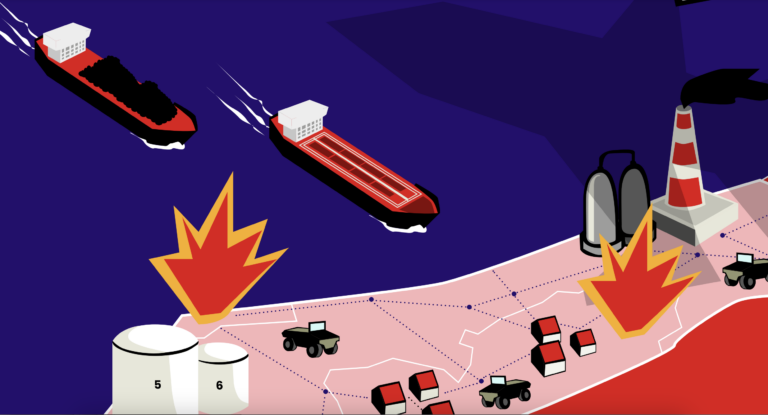
Five strategies corporations use to avoid responsibility for human rights abuses



Hiding behind complex supply chains, undermining unions, disseminating distorted information – these are just a few of the ways that corporations try to avoid responsibility for human rights abuses and environmental damage across their supply chains. In a bid to systematically list these harmful practices for the first time, a consortium of ten organisations, led by the SOMO, is launching Mind the Gap(opens in new window) . The result of an ambitious international research project, this new website highlights the urgent need to close the governance gaps that are sustaining a global system of corporate impunity.
Typically, research on corporate abuse – whether undertaken by journalists, academics, or non-governmental organisations – tends to focus on the negative on-the-ground impacts for people and the environment. While this is an important condition for corporate accountability, it is often not enough to persuade companies to repair the damage and change their ways. In the absence of robust regulation, multinationals are still able to obfuscate their involvement and avoid responsibility, leaving society to deal with the consequences.
“To counter harmful corporate behaviour, policy makers as well as the general public need a much better understanding of how companies operate,” says Mariëtte van Huijstee, senior researcher at SOMO. “With ‘Mind the Gap(opens in new window) ‘, for the first time we have systematically listed and analysed the most common corporate strategies used to avoid responsibility. While these strategies may not always be designed with the specific aim of avoiding responsibility, evidence shows their use has led to limited accountability for negative impacts, which harms victims and the public interest.”
Five main strategies
The consortium identified five main strategies that enable corporations to avoid responsibility for harm caused. In practice, these harmful strategies manifest themselves in a wide array of actions by corporations that obstruct justice, distort the facts and frustrate remedy for affected communities.
- Constructing deniability – This happens when companies hide behind complex supply chains, outsource high-risk activities to subcontractors, or decide to suddenly shut down subsidiaries, obscuring their role in any harms caused.
- Avoiding liability through judicial strategies – The use of judicial strategies to ward off public scrutiny and respond to allegations from communities, workers and human rights defenders.
- Distracting and obfuscating stakeholders – Confusing stakeholders by spreading misleading information, manipulating scientific research or abusing certification standards.
- Undermining defenders and communities – Silencing critics by attacking and criminalising human rights defenders, dividing communities with bribes and undermining unions.
- Utilising state power – This refers to the behaviour by companies that leverage their power with states to obtain favourable treatment, security and impunity.
These strategies combine to sustain a system in which international business remains unaccountable for the environmental and human rights damage it produces, while victims continue to draw the short straw.
Cases provide evidence for the strategies
The multiple case studies featured in the new Mind the Gap website clearly highlight the wide prevalence of these harmful corporate strategies in practice. A telling example is the 2019 Brumadinho dam disaster in Brazil, which killed over 270 people and seriously polluted the environment.
“Mining company Vale assured time and again that the dam met all the safety requirements, but Brazilian prosecutors have collected evidence that the company sought certification while knowing about the severe safety risks,” said Júlia Mello Neiva from the Brazilian NGO Conectas, one of the organisations behind Mind the Gap.
In other cases, companies simply leverage their power with states to obtain favourable treatment, security and, if necessary, impunity. A well-documented example of this is HeidelbergCement, a German multinational that is active in Occupied Palestinian Territory through a local subsidiary.
“This company can only operate its stone quarry in the West Bank with the backing of the Israeli occupation authorities,” says Wesam Ahmad from Mind the Gap partner Al-Haq. “HeidelbergCement directly profits from and contributes to Israel’s illegal occupation, settlement construction, and systemic human rights abuses, while enjoying protection of the Israeli authorities and shielding its headquarters from possible liability at the international level.”
Protecting corporate interests
Many of the strategies identified here are not inherently illegal. In fact, many of them are widely accepted by state officials, managers, consultants and legal advisors as a way to protect corporate interests. Nevertheless, these strategies are very harmful for both society and the environment.
Van Huijstee adds: “Through this project, we shed light on the effects of these strategies, question their wide acceptance, and call on policy makers to close the governance gaps that allow them to take place.”
Do you need more information?
-

Virginia Sandjojo
Senior Policy and Advocacy Officer
Partners
-
Cividep India – Civil Initiatives for Development and Peace India
-
PODER – Project on Organizing, Development, Education and Research



Related news
-
 The hidden human costs linked to global supply chains in ChinaPosted in category:News
The hidden human costs linked to global supply chains in ChinaPosted in category:News Joshua RosenzweigPublished on:
Joshua RosenzweigPublished on: -
 The power to extract value from the value chainPosted in category:Long read
The power to extract value from the value chainPosted in category:Long read Rodrigo FernandezPublished on:
Rodrigo FernandezPublished on: -
Powering injustice Published on:
 Lydia de LeeuwPosted in category:Publication
Lydia de LeeuwPosted in category:Publication Lydia de Leeuw
Lydia de Leeuw

